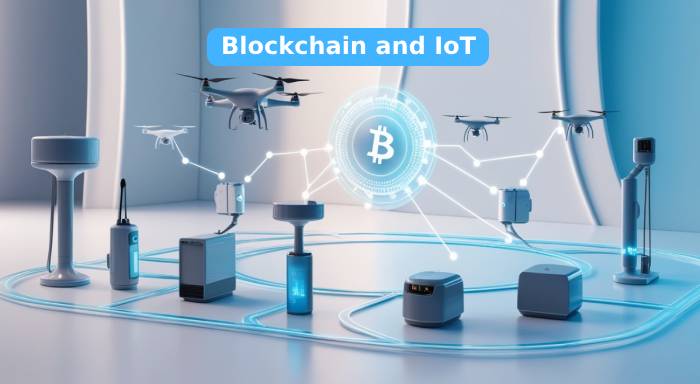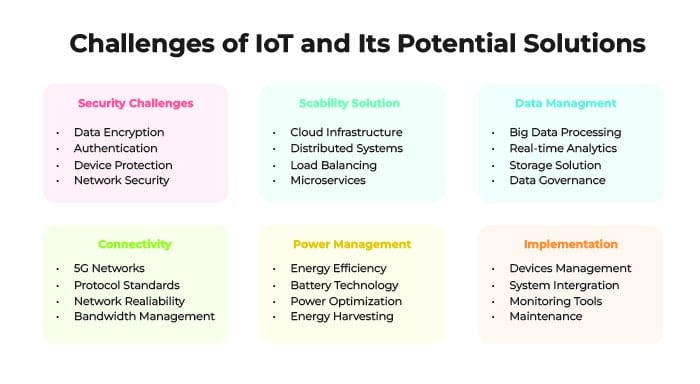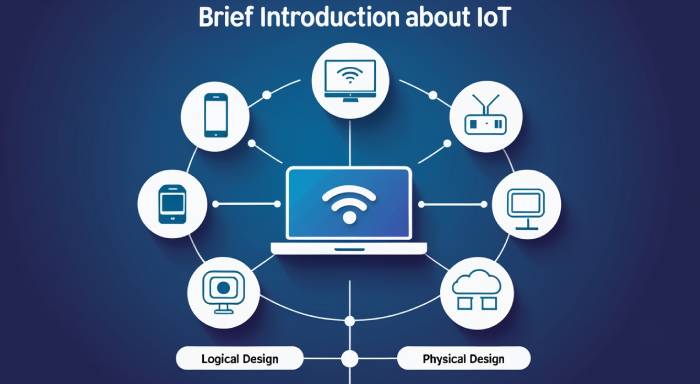To remain competitive in today's contemporary world, businesses are implementing cutting-edge technologies. Two powerful technologies at the pioneer digital transformation are the blockchain and internet of things (IoT) , which are combined together to reshape Industries. Blockchain guarantees transparency and unparalleled security because of its decentralized and immutable nature. Meanwhile, IoT enables smart devices to collect, share real-time data, optimizing workflows and seamless connectivity from physical devices. Also provide valuable insights from real world operations.
The synergy between Blockchain and IoT addresses challenges such as scalability and data security. It holds the power of unprecedented advancements across various industries from healthcare to supply chain management. This blog delves into how blockchain and IoT are driving together to transform industries with decentralized solutions and highlights the remarkable benefits they offer.
What is Blockchain?
Blockchain technology is a cutting-edge database mechanism that shares transparent data within the business network. Blockchain database is used to store the chronological data in the form of blocks which means the data can not be altered or deleted. It plays a crucial role in cryptocurrency systems, used to maintain and secure transactions. Blockchain operates on a decentralized network which reduces the risk of fraud over traditional systems that depend on centralized frameworks.
Key Features:
- Decentralization: Blockchain minimizes the need for centralized authorities by distributing control throughout the network.
- Immutability: Data in records cannot be changed or removed since they are immutable.
- Integrity: By providing access to transaction histories, you may maintain transparency with stakeholders.
- Security: Prevents unauthorized access to the data by using cryptography techniques.
What is IoT?
The Internet of Things (IoT) refers to the network of interconnected physical devices embedded with sensors that communicate and exchange data without human intervention. IoT is transforming everyday life, by enabling real time monitoring and automation. IoT levels encompass all connected devices and sensors that analyse, visualise and communicate through IoT gateways, routers and APIs to deliver actionable insights within the IoT ecosystem.
Key Features:
- Data driven Insights: Provides actionable insights by analysing vast amounts of data.
- Scalability: Able to integrate billions of devices into a single network.
- Interconnectivity: Devices can connect and share data seamlessly.
- Automation: Enabling intelligent, self regulating systems that reduces human intervention.
The Internet of Things and Blockchain Integration
Blockchain offers a safe and efficient method of handling the enormous amount of data produced by IoT. Businesses can overcome challenges and seize new possibilities by adopting these technologies. Traditional methods use centralised systems prone to vulnerabilities like breaches and cyber attacks but blockchain’s decentralized system and immutability provides secure and robust solutions. By linking IoT sensors in tracking systems, businesses can achieve greater visibility into their supply chains ensuring product authenticity.
Benefits of Blockchain-IoT Integration
- Data Integrity: Blockchain ensures that IoT generates accurate and reliable data.
- Cost Efficiency: Eliminates the dependency on intermediaries through direct device to device communication.
- Improved Security: Decentralised systems reduce the risk of failure of cyber attacks.
- Enhanced Scalability: Blockchain enables seamless management of growing IoT networks.
Real World Applications
Blockchain and IoT integration transforming in various sectors. Below are some real world applications:
- Building Smarter Cities
IoT design methodologies are used by smart cities to better manage waste, control traffic, and maximize energy efficiency. Blockchain makes sure that this data is exchanged safely, which makes urban planning more effective and transparent.
- Advancing in Agriculture
IoT devices are used by farmers to track crop performance, soil health, and environmental factors. Blockchain captures this information, offering insights that enhance sustainability, minimize waste, and optimize farming methods
- Transforming the Supply Chain
Supply chain management improves accountability and transparency thanks to blockchain and IoT. Through the use of blockchain technology to track the path of supplies and IoT sensors to monitor them, businesses can avoid fraud, guarantee product authenticity, and optimize processes. Payments and inventory management are two tasks that smart contracts automate.
- Improving Health Care
The role of IoT in healthcare has revolutionised in recent years. Real-time patient data is gathered by IoT devices, and blockchain protects the communication and storage between healthcare providers. Better patient outcomes, effective treatment delivery, and accurate diagnoses are all assured by this. For example, vitals tracking wearables may transmit data to a blockchain network that is only accessible by authorized personnel.
The Future of Blockchain and IoT
The integration of blockchain and IoT is still in its early stages, although they have the potential to transform businesses. Future development in this integration allows for more possible innovations including decentralized machine learning models. AI-driven IoT devices, and innovation in the physical designs of IoT ensure these systems are reliable and flexible for future needs.
Key Trends to Track:
- Federated Learning: creating decentralized, privacy-preserving AI models .
- Industry Standards: To improve acceptance and interoperability, industry standards are being developed.
- AI Integration: Integrating blockchain, IoT, and artificial intelligence together to create more intelligent, flexible systems.
Conclusion
Together, blockchain and IoT are revolutionizing industry operations by resolving issues like transparency, scalability, and security. This potent combination opens new opportunities across industries, from transforming supply chains to building smarter cities. A decentralized connected future will be shaped in a significant way by the integration of these technologies as they develop further.








